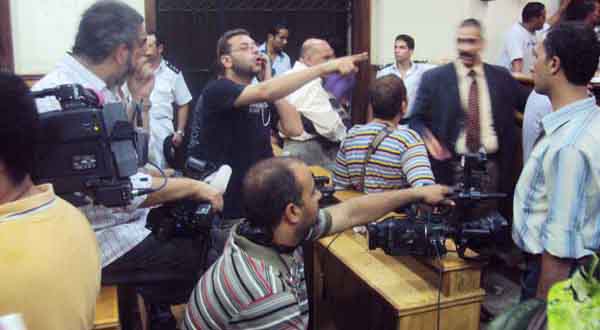 CAIRO: The recent supreme judicial council decision that bans TV broadcasters and journalists from covering ongoing trials via audiovisual devices has stirred an ongoing debate, pitting judges on one side against lawyers and journalists on the other.
CAIRO: The recent supreme judicial council decision that bans TV broadcasters and journalists from covering ongoing trials via audiovisual devices has stirred an ongoing debate, pitting judges on one side against lawyers and journalists on the other.
While judges believe that the media has recently had a negative impact on the public's opinion of several court cases, lawyers and journalists argue that the public has a right to know what's happening within the country's legal system.
Deputy Head of the Cassation Court Ahmed Mekky clarified a vague aspect of the decision, stating that publishing news about hearings has not been completely banned as long as the news coverage itself does not include information about the prosecution's investigation or any sorts of audio or video recordings.
“[Reporting news about trials] is derived from the concept of publicity on which court hearings are based,” Mekky told Daily News Egypt. “The constitution has granted citizens the right of publicity … [which is one of the conditions guaranteeing] the independence of the judiciary.”
Based on Constitutional Article 169, all court sessions shall be made public, unless a court decides to hold sessions in a judge's private office due to concern over issues concerning morality or that may threaten the public harmony. In all cases, judgments shall be officially announced in public sessions.
The actual ban, however, has only been imposed on television broadcasts of court hearings, according to Mekky.
“The TV has an impact on public opinion [in that it has the capability of editing] video recordings. Had we been guaranteed that the media would broadcast the whole hearing and give a full picture of what happened, we would not have imposed the ban,” said Mekky.
“Court hearings are not material for TV entertainment … if we observe the headlines over the past year, we will find [almost] nothing but trials,” he added.
“Publicity does not mean that 50 or 100 people are allowed to attend a trial,” said Hafez Abu Saeda, who is both a lawyer and the secretary general of the Egyptian Organization for Human Rights. “The TV enables a wider spectrum of the public to follow [notable court cases]. If thousands read print media, millions watch TV channels.”
Some trials, according to Mekky, have been the primary focus of many television programs in the last few years, and the programs tend to be greatly biased towards one party.
“We as judges can hardly guarantee equality inside courtrooms,” Mekky said. “But we have no control over the media.”
“What about the citizens who can't read or write? How can they follow the news in print media?” Abu Saeda asked. “If the supreme judicial council found any violations committed by TV channels [in their coverage of trials], why didn’t it prosecute them?”
Head of the Supreme Judicial Council Serry Seyam said in a recent press conference — following filming of the defendant being pulled out of a deportation car while handcuffed — that filming defendants in many court situations is against the law, since doing so is considered emotionally harming to him.
“Doesn’t placing the defendant handcuffed inside a dock during the trial session … cause him or her emotional distress?” questioned Abu Saeda.
“I can’t understand the logic behind this decision,” he added. “If it has to do with filming defendants, cameramen can be ordered not to shoot them and direct their attention to [other aspects of the trial].”
Seyam stated that the presence of cameras and microphones in the courtroom causes additional distractions and stress among judges, prosecutors and lawyers, which could ultimately affect their performance in the courtroom.
However, Abu Saeda said that he has worked on public opinion cases — including the alleged manslaughter of Khaled Saeid in Alexandria — where cameras had never caused him to feel any discomfort while doing his job.
The law, according to Abu Saeda, dictates that the judge has the right to decide whether to hold a hearing in public or in a closed session. If the judge is concerned about how the media might affect a case's outcome, they could simply exercise this right.
Abu Saeda did not rule out the possibility that the decision was influenced by a number of cases that made headlines where public figures and ruling National Democratic Party members were involved.
Many journalists believe that — as a result of this judicial decision — the government has imposed even more media obstacles in a country where the freedom of speech is already questionable.
“The decision [could be] part of a media crackdown that the government imposes ahead of parliamentary elections,” Adam Makary, a producer at international satellite TV channel Al-Jazeera, told Daily News Egypt.
“I think the government wants to keep a low profile [regarding media coverage],” Adam Makary, a producer at international satellite TV channel Al-Jazeera English, told Daily News Egypt. “Usually information gives people power.”
Makary believes that the recent judicial decree makes his job as a television journalist more difficult.
“If we don’t have a picture, then we don’t have a story,” Makary stated.
Earlier this week, the courtroom security reportedly ordered the attendees and reporters to hand over their mobile phones until the hearing for the Naga Hammadi case was over, fearing that someone may use their phones to record the courtroom proceedings.
In May, the chief editors of two independent newspapers were questioned by the public prosecutor for publishing the transcript of an investigation into a major bribery case. Two state council members and a high-profile businessman were implicated in the case. –Additional reporting by Heba Afify.



